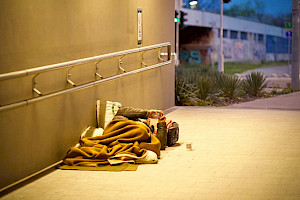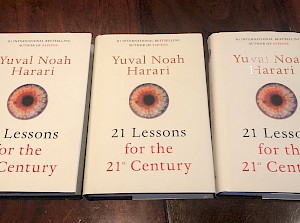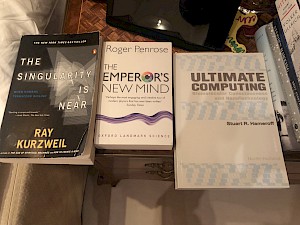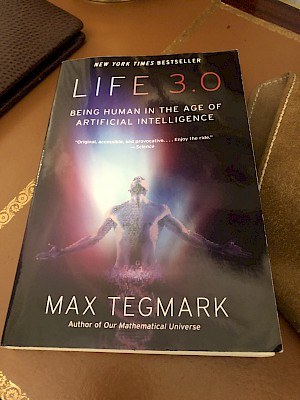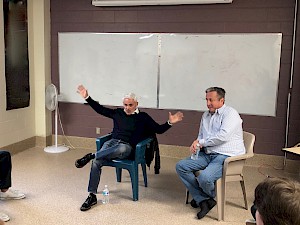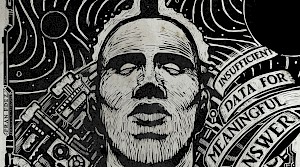40 Chances: Finding Hope in a Hungry World
May 04, 2021A Book Review
40 Chances: Finding Hope in a Hungry World
by Howard G. Buffett
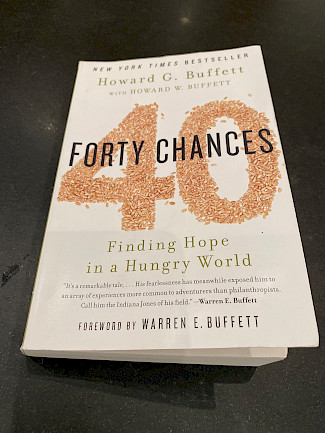 We used to have a saying when I was in my 30s: “Only 30 summers left before we’re 60.” It was meant to underscore both that life is short as well as the importance of making the most of the time we have while we’re young. Similarly, in the book “40 Chances: Finding Hope in a Hungry World”, Howard G. Buffett uses the phrase to emphasize that we all have approximately 40 years to accomplish our goals. As a farmer he borrowed the phrase from his own community, in that farmers produce about 40 harvests over their lifetime. As the years pass, they try new things and – hopefully – learn from their mistakes as they work to get the most out of their land.
We used to have a saying when I was in my 30s: “Only 30 summers left before we’re 60.” It was meant to underscore both that life is short as well as the importance of making the most of the time we have while we’re young. Similarly, in the book “40 Chances: Finding Hope in a Hungry World”, Howard G. Buffett uses the phrase to emphasize that we all have approximately 40 years to accomplish our goals. As a farmer he borrowed the phrase from his own community, in that farmers produce about 40 harvests over their lifetime. As the years pass, they try new things and – hopefully – learn from their mistakes as they work to get the most out of their land.
Buffett tells 40 stories about lessons he’s learned in philanthropy, with topics ranging from his own farming operation in the US to some of the most difficult and dangerous places on Earth. But his message goes beyond his personal tales and is also about a philosophy. It’s a way of thinking that should speak to all of us. Especially those of us wanting to make a difference. It’s about reasons to hope, even in the face of insurmountable odds. Given the similarities in our respective philanthropic works, this book resonated with me on a number of levels. And I can relate to his approach to getting things done. Buffett takes risks. He doesn’t have what’s referred to as “paralysis by analysis”. Rather he jumps in and is not afraid to learn by making mistakes.
The son of famed investor Warren Buffett, Howard started life as a farmer. And it was a life he truly loved. But it was when his father proposed a challenge and endowed his foundation, that his life truly changed. The challenge was to provide food security to about a billion of the most vulnerable people on earth by exhausting $3 billion and effectively put the organisation out of business in 40 years. Or in other words, make his input redundant by creating initiatives that are sustainable.
Each chapter tells a different story. Most are about his extensive travel to developing countries in Africa and Central America. Buffett, an accomplished photographer, takes us on a journey through photographs. He recounts tragic stories about the ravages of conflict and malnutrition, layered with technical information on the underlying issues of food and varying solutions. As co-chair of the International Crisis Group, deadly conflict is a subject matter I am quite familiar with, and I see the devastating effects of different types of it on communities around the world.
“Conflict is ugly and takes a long-lasting toll on children and families. It ruins agricultural production, disrupts the shipping of food and destroys the land. Conflict is one of the leading if not the leading cause of hunger”, Buffett writes. It’s true, food is power and is often used as a weapon in conflict. That is why I take my work with ICG so seriously. Without peace, you can forget about fixing all other social issues.
Persistent and chronic malnutrition is another problem that plagues much of the world. Three million children die each year from malnutrition and hunger-related issues. That’s incentive enough for people like Buffett to focus their attention on food security. He sees enabling smallholder farmers as a big part of the solution. Low income farmers provide 80% of food consumption in the developing world. There are around 500-million of them, and most live on less than two dollars per day. It was actually this statistic that inspired me to launch Acceso. For the past dozen years, we have been developing social enterprise models to lift poor communities in Latin America and the Caribbean out of poverty through our farmer services model.
Farming methods, soil degradation and deforestation are other topics Buffett covers extensively. Soil degradation is one of the greatest threats facing humanity today.
When you take into account that the world’s population will reach nine billion by 2050 and will need an increase in food production by 70%, our blatant abuse of the soil needed to grow that food is a travesty.
But the real tragedy is that solutions do exist. Unfortunately, humans don’t seem to have the capacity to look far into the future when considering our own welfare. On a micro scale, some of this is understandable. When it comes to say, deforestation, there is an old adage, ”no one will starve to save a tree”. On a macro scale, however, there is a lot that can be done with proper planning and good governance.
Sadly, and as Buffett points out, “Everywhere, there is a waste of resources, corruption and unintended consequences from failed policies.” Not all countries are created equal when it comes to planning and governance. Many countries in Africa create “barriers” to proper development. Buffett asks himself the same question that we at Acceso did when choosing where to deploy good deeds. “Should I increase attention to Latin America where more governments are better attuned to agriculture?” It’s a tough question, given the need in places like Africa outweighs that of other developing nations. We shared similar frustrations when trying to implement our programs in Africa and for the time being, we are focusing on Latin America and the Caribbean.
In his book Buffett addresses other issues related to food security, like water supply and the “aid” industry. On aid he comes to the conclusion that, “Aid does not change the underlying dynamics. The math does not add up if solutions are temporary. There is not enough money in all philanthropy to ‘save’ even half the villages in Africa.” In the end, he expresses his philosophy on philanthropy much in the same way I see it.
“I will always be a pessimistic optimistic but the effort to lift people out of the dehumanizing and painful state of food insecurity will always be worth it. And sometimes it will even work.”
Amen to that, Howard.


